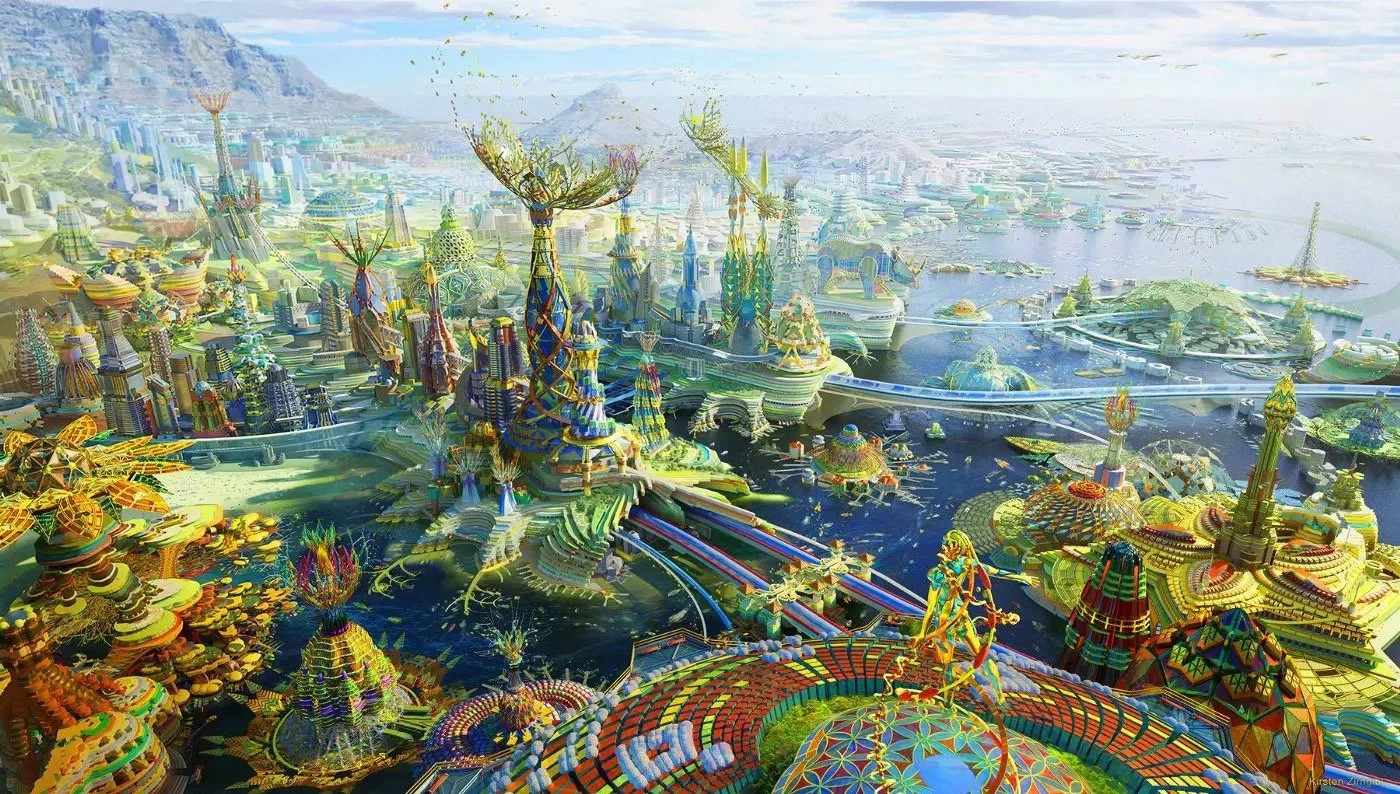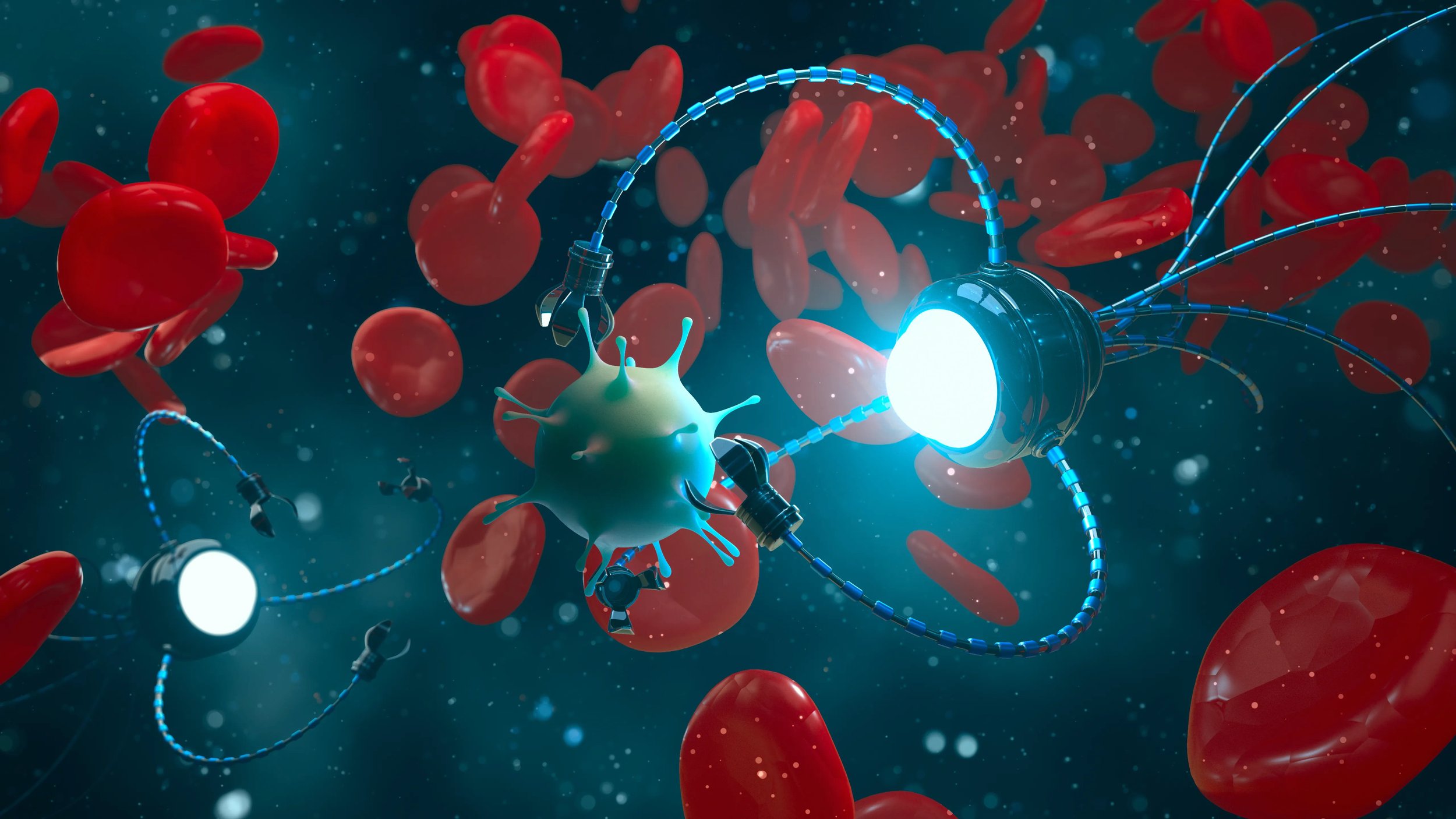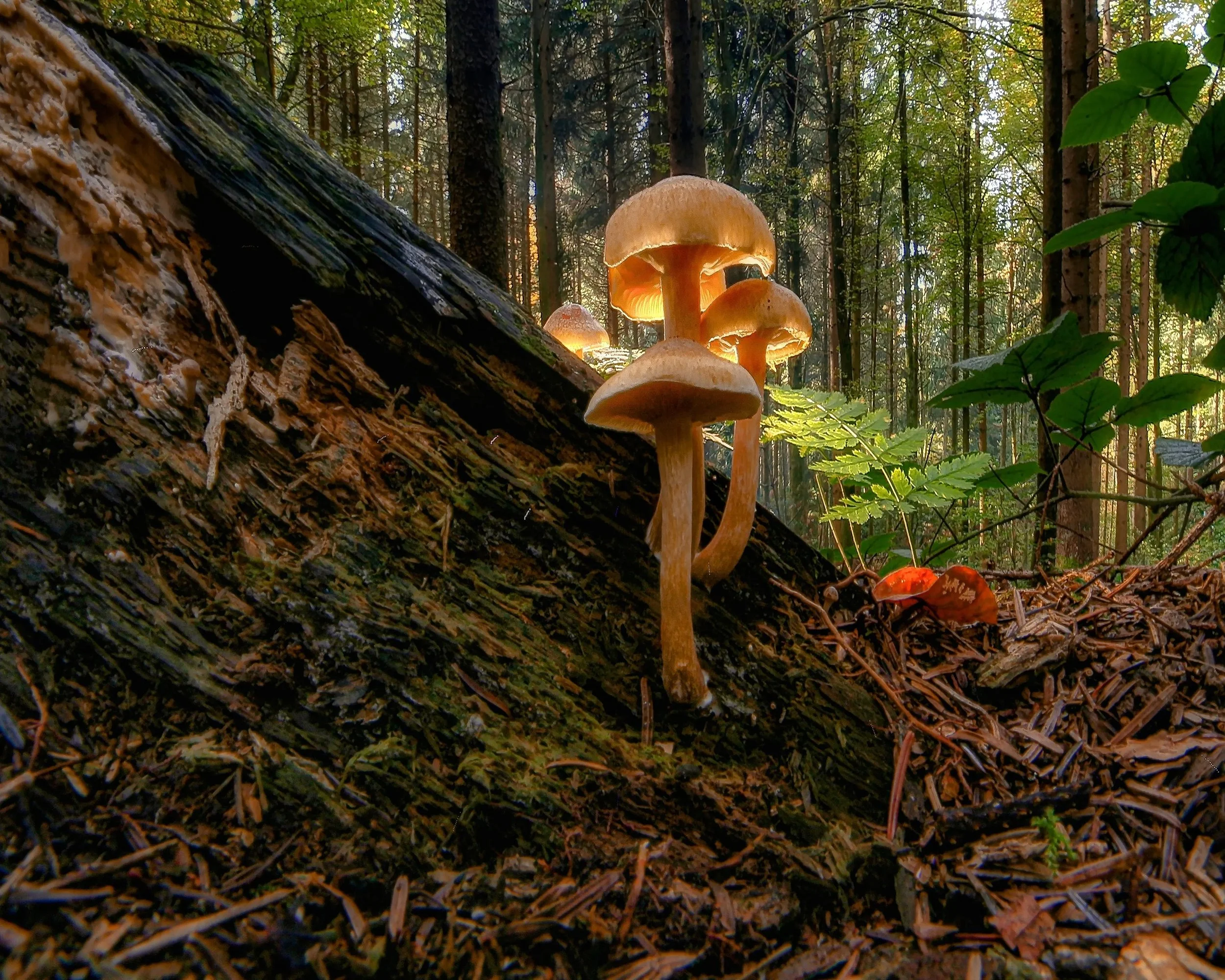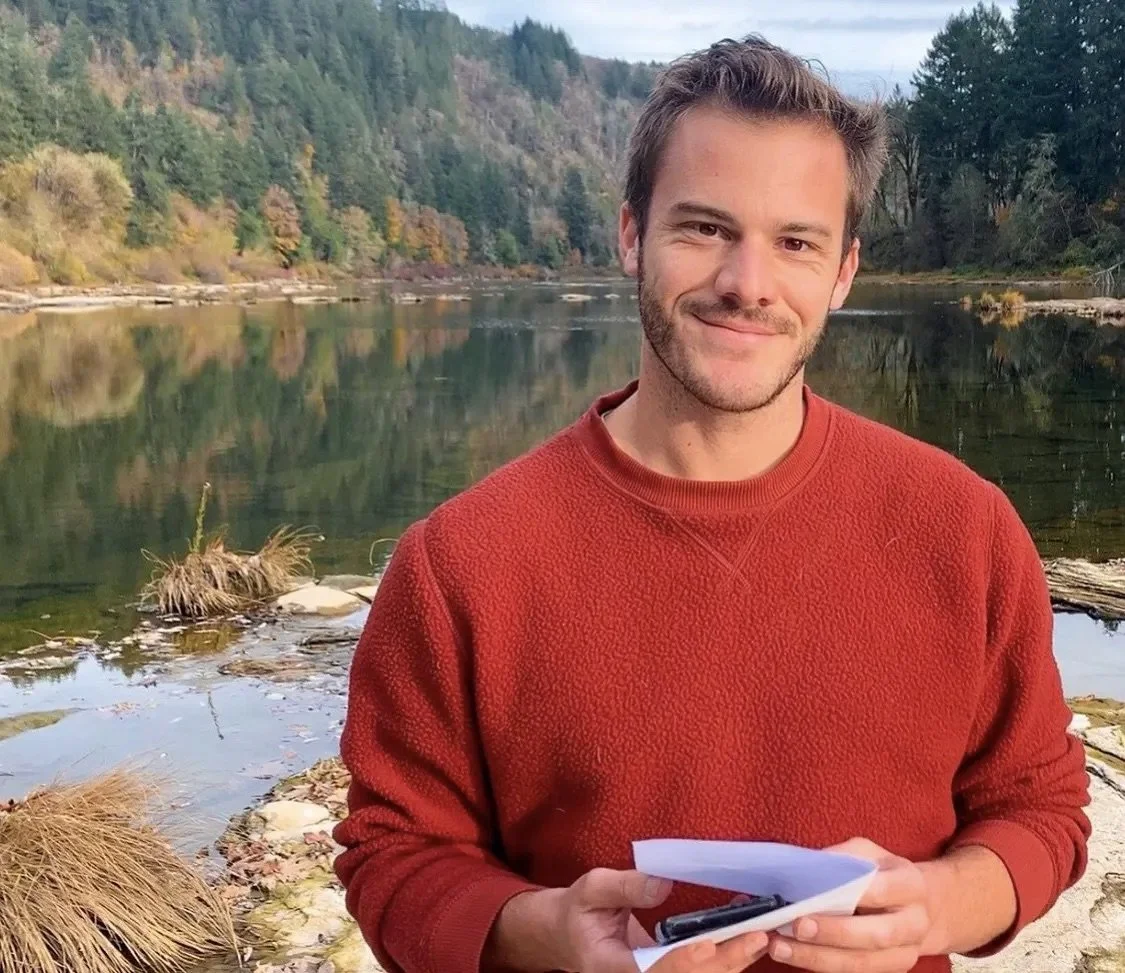CLIMATE CHANGE COULD SPUR A RENAISSANCE, IF WE LET IT.
LESSONS LEARNED FROM MY YEARS AS AN IMMUNOLOGIST
Above artwork Futuristic City by Kristen Zirngibl.
The problem people often have with accepting climate change isn’t the science of whether it’s happening, it’s stomaching the solutions. Many believe addressing climate change will rob their world of its modern conveniences and sophistication. I am a firm believer in the opposite. Reconfiguring our world in response to climate change could bring about a far better future, ushering in the next Renaissance.
Western society is being forced to address the ecological systems it’s historically ignored and maltreated. Climate change has made it clear we all rely on the proper functioning of our shared biological and earth systems. Instead of limiting us, I believe recognizing the complexity and intelligence inherent in these complex systems will unlock a new era of human sophistication. I believe this because I witnessed a similar pattern of progress when I was working as an immunologist.
After grad school I spent several years modifying human immune cells. Our goal was to “teach” the immune cells how to recognize and kill cancer in the body. Although it may sound fancy, the most important lesson I learned from studying biology is how limited our abilities are, and how fascinatingly complex biology is. Ordinary life we often overlook and take for granted, far exceeds in sophistication and elegance our most advanced human technologies.
A concept drawing of a nanobot studying a virus in the blood stream
We once envisioned nanobots coursing through the bloodstream with little lights and arms as the holy-grail of medicine. The early 2000s brought us images of tiny man-made metal robots swimming through our veins curing diseases. In retrospect, those images seem a bit silly and portray a particular naïveté: we believed human ingenuity through the machine was the pinnacle of all possibilities.
Scientists eventually abandoned this particular vision when they learned that nature had already created nanobots of its own. We realized that proteins, DNA, viruses, bacteria, and cells themselves are nanobots at scales and complexities far beyond our machine fabrication abilities. The mRNA COVID vaccine is the latest example of biology’s gifts. Instead of trying to destroy a disease with something purely man-made, we harnessed biology’s existing power. By giving our cells the instructions to recreate a harmless piece of coronavirus we allowed our immune system to take care of the rest.
Empowering the body’s more complex regulation systems, instead of imposing regulation, has become a common theme in advanced medicine. When I was working in cancer research, we trained patients’ own immune cells to recognize a single “fingerprint” associated with the type of cancer they had. This method was cutting edge yet still rudimentary as it could only target one “fingerprint”. Ultimately, our hope was we could initiate an immune response with our relatively simple therapy, and kickstart the body’s much more comprehensive immune response which is capable of recognizing virtually any “fingerprint” that could ever exist. These fingerprints are called epitopes and the phenomenon we were hoping to ignite is called epitope spreading, from one to many.
Since leaving biotech, I have held on to epitope spreading as a beautiful metaphor for our current ability to intervene in complex systems. Our biggest opportunity is to play a support role to kickstart much larger, more powerful biological systems. To me this means there is a huge potential to cultivate biological systems as a rich area of innovation, from the circular economy and regenerative farming to biomaterials. If we are in the infancy of mastering complex systems (because we are in the infancy of even acknowledging them), that could mean we are on the precipice of a Renaissance.
Supertree Grove at Gardens by the Bay, Singapore
The Renaissance perfectly captures the idea that one can have a “rebirth” of old values that still propels society forward into the future. In the 15th century this was the re-adoption of Roman humanism and Greek philosophy. In the case of the Climate Change Renaissance this will be the rebirth of the type of ecological knowledge exhibited by Indigenous science and Earth-based cultures. In modern terms, this will be a turning away from mechanistic and extractivist thinking toward complexity science and the intelligence of biological systems.
In the past couple of years, biology has rightfully entered into the limelight as an under-appreciated source of wisdom. Suddenly everyone is appreciating how trees communicate, how slime molds can recreate the Tokyo subway system, or how fungus can break down oil spills or be made into a leather-like material.The collective consciousness seems to finally be discovering that there is an intelligence in living systems that is beyond our capabilities and deserves our immediate attention
Mushrooms growing in a forest in Switzerland
Mushrooms growing in a forest in SwitzerlandToday’s problems are largely caused by a dominant culture that has remained illiterate to the complexity of Earth’s ecosystems. This culture created very advanced technology in many ways but proved itself to be inelegant, short-sighted, and blundering with concepts like infinite growth, waste, and pollution. This culture’s brazen march toward self-destruction helps us realize there is plenty of room for improvement.
This realization is immensely important because we have raised generations of people who are enthralled with the idea of progress through technology. Many are hearing from the climate movement that we must stop progress, a central pillar of our identity as a modern society. That is both a bad strategy and untrue.
- “Fantasies are easy. Dare to meet the Earth as it is, and create a world far better than we previously imagined.”
Cloud Forest, Gardens By The Bay, Singapore
Rising to meet climate change is not some faux-nostalgic return to a simpler time, it isn’t anti-technology or anti-progress, it is the most complex and rewarding challenge we will ever endeavor to meet. As French philosopher Bruno Latour wrote in his book Down to Earth, “There is nothing more innovative, present, subtle, technical… nothing less rustic and rural, nothing more creative, nothing more contemporary than,” living within the boundaries of our Earth system as it actually exists.
For people who cannot grasp letting go of their core belief in progress, I have great news, you don’t have to. There is still a giant opportunity for innovation, enterprise and discovery. What changes are the direction, goals, and rules. This paradigm shift is only possible if we can accept the premise that biology itself (and through its extension the larger ecological Earth system) is the most advanced form of technology we have.
If we are to be progress-oriented, let it be in the direction of understanding the Earth we live on, the ground beneath our feet, the ecologies that enable our existence. That is true progress. Fantasies are easy. Dare to meet the Earth as it is, and create a world far better than we previously imagined.
SPENCER R. SCOTT, PHD
I'm a scientist, environmentalist, and writer trying to help reconfigure our relationship to Earth and each other. I find it nothing short of a miracle we find ourselves conscious in this astonishing universe. I spend my days wondering what our society would look like if we acknowledged how precarious and precious our existence is. The values of modern society have left much to be wanted in the way of meaning and purpose. I try to interrogate what is missing, and imagine what might we create to fill those gaps. Through a great stroke of irony, climate change, the force that threatens to undo us, may provide the necessary wake-up call to give our striving purpose and help us find value in all that surrounds us.
To check out more of Spencer's work head to his website or Instagram.






